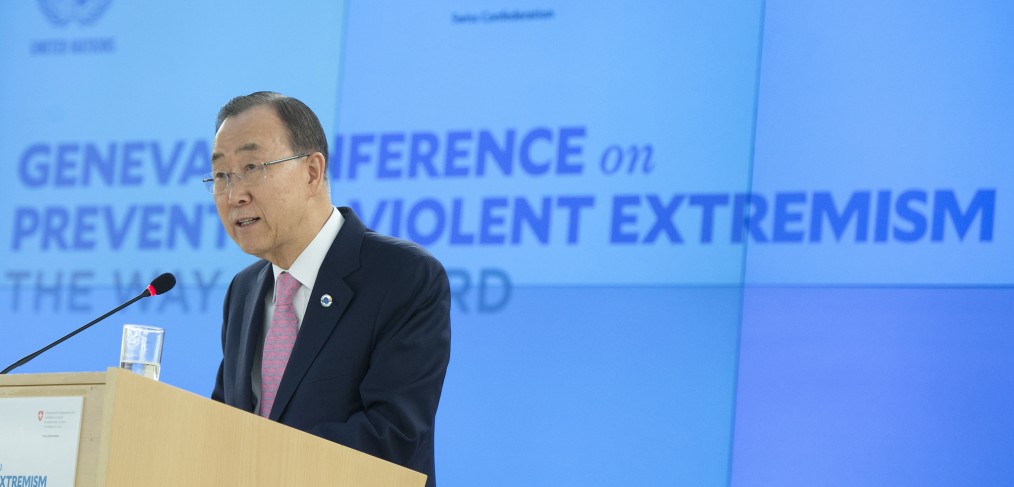
Geneva Conference on “Preventing Violent Extremism: The Way Forward” – A Summary
On Thursday 7 and Friday 8 of April 2016 the United Nations Office in Geneva organised a conference under the title Preventing Violent Extremism: The Way Forward. The conference was co-hosted by the Government of Switzerland and the United Nations with the goal of bringing together the international community to exchange experiences and lessons learned in preventing radicalisation and violent extremism. Attendees at this conference included senior experts and practitioners from relevant fields, as well as heads of international and regional organisations and heads of UN agencies who are engaged in policy-making and practices to counter the spread of violent extremism at the local, regional, and global levels.
The event was also meant as a platform to discuss and build consensus around the United Nation’ Secretary General Plan of Action to Prevent Violent Extremism ahead of the General Assembly scheduled in June. The Plan calls for a coherent and concerted effort by the international community to systematically address the drivers of radicalisation in order to prevent the further spread of violent extremist ideologies. The Plan stresses the importance of proactive, preventive action which takes a broader view of counter-violent extremism than traditional security measures employed in the past. In particular, the proposed Plan provides over 70 recommendations and identifies 7 priority areas for action: i) dialogue and conflict prevention; ii) strengthening good governance, human rights and the rule of law; iii) engaging communities; iv) empowering youth; v) gender equality and empowering women; vi) education, skills development and employment facilitation; and vii) strategic communications, the internet and social media.
Day #1
The day of the conference brought together senior experts to discuss key issues related to the Prevention of Violent Extremism (PVE). Participants were asked to reflect on the PVE Plan of Action in the context of the larger United Nations Prevention Agenda. In the first session of the day, Alistair Millar, the Executive Director of the Global Centre on Cooperative Security, congratulated the UN on its work to catalyse preventative action, but also called for those present to give serious consideration to measuring impact and to integrate lessons learned into the development of national PVE strategies. During the second session, participating panelists sought to define the phenomenon of ‘Violent Extremism’ and debated the extent to which underlying socio-economic factors, such as poverty, poor governance, inequality, discrimination and marginalisation, can be considered drivers of violent extremism. Panelists also examined the role of religious discourse in the justification and promotion of violent extremist ideologies. The panel saw the participation of speakers from Bangladesh, Egypt, the US, and the European External Action Service.
In the afternoon, the participants’ attention turned to establishing priorities for national PVE Plans of Action. The chair of this discussion, Ambassador Heidi Grau, asked the speakers: to identify key priorities and good practices in developing and implementing national Plans; to address the need to ensure national and local ownership of these Plans; to ensure impact under the seven priority areas as identified by the Secretary General’s Plan of Action; and to consider the role of the United Nations in supporting Member States in the development and delivery of their Plans.
The last session of the day saw Ambassador Thomas Greminger chair a session on mobilising resources and invited participants to consider how existing funds and resources could be utilised more efficiently to create synergies with other areas of international work on peace and state building. He further asked whether existing funds could be adapted to ensure that their programming takes PVE goals into consideration, and what other funding sources could be directed towards preventing violent extremism. Lastly, Greminger pointed out that multi-stakeholder cooperation has proven successful in international development efforts and suggested that it would be of mutual benefit if the private sector were further engaged in PVE and their resources mobilised for PVE activities – he gave an example of the work being done in social media and information technology as a case in point.
Day #2
On the second day of the conference, participants looked at national and regional PVE perspectives with an eye to determine what action should be taken at the global level. UN Secretary General Ban Ki-Moon opened the day’s discussions by calling for unity and collective action in defiance of the violent extremists who aim to divide communities and incite hatred and fear. Secretary General Ban Ki-Moon further explained his Plan as based on five interrelated points, namely: i) the need to put prevention first; ii) the importance of national ownership; iii) the urgency of international cooperation; iv) the role of the United Nations; and v) the fundamental need for consensus and unity that should reflect the ‘idealism, creativity and energy’ of the 1.8 billion young people that participants at the conference represented.
In the following sessions, ministers, deputy ministers, heads of delegations, international and regional organisations offered their particular perspectives on preventing violent extremism and how their work, experience and concerns relate to the Secretary General’s Plan for Action. Finally, in a session co-chaired by Under-Secretary-General Jeffrey Feltman and Ambassador-at-Large for Counter-Terrorism Stephan Husy, delegates reflected on the support that the United Nations, as well as other international organisations, are already providing and could further provide to the individual efforts of regional organisations and UN Member States on the PVE front.
Additional resources:
For further information please see:
- Plan of Action to Prevent Violent Extremism – Report of the Secretary-General
- Plan of Action to Prevent Violent Extremism
[Image shared by UN Geneva via Flickr; CC BY 2.0]

One comment